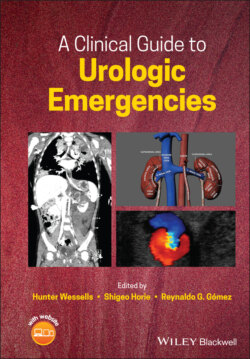Читать книгу A Clinical Guide to Urologic Emergencies - Группа авторов - Страница 15
Epidemiology, Etiology, Pathophysiology Epidemiology and Etiology
ОглавлениеKidneys are the most injured genitourinary organ in external trauma, and it is estimated that 1–5% of all traumas and 10% of abdominal traumas sustain a renal injury [1–4]. In a series consisting purely of blunt abdominal trauma mechanism, 15% of patients were found to have an injury to the kidneys [5]. Of all patients who sustain genitourinary trauma, over half of them involve the kidney [6]. A population‐based study found the incidence of renal trauma to be 4.9 per 100 000 population ≥16 years of age in the United States [4]. The majority of these patients were young and male, with 72% between the ages of 16 and 44 and 75% male. In an analysis of pediatric genitourinary injuries, renal injuries were found to make up 3.5% of the cohort, but the incidence has not been defined [7].
There is variation in the etiology of renal trauma based on geographical location; series from Low and Middle‐Income Countries (LMIC) suggest that the rates of penetrating trauma are high, with the majority of blunt trauma caused by road traffic accidents, assault, and falls [8–11]. In the More Economically Developed Countries (MEDC), the vast majority (90–95%) of renal injury is sustained by blunt trauma, which is caused by motor vehicle collisions (63%), falls (14%), sports injuries (11%), pedestrian accidents (4%), motorcycle crashes (2%), assault (2%), and the remaining from other causes [6, 12, 13]. In a recent blunt renal trauma series, 80% of injuries were found to be grade I–II renal injuries, 9.5% grade III, 8.1% grade IV, and 2.7% grade IV [5]. Thus, imaging all renal injuries is unnecessary, and criteria have been developed (see below). Table 1.1 summarizes the large (n > 100) series with emphasis on blunt injuries.
Table 1.1 Demographics of renal trauma.
| SERIES a | [6] | [14] | [15] | [1] b | [4] | [16] | [5] b | [17] | [18] | [19] |
|---|---|---|---|---|---|---|---|---|---|---|
| Year published | 1984 | 1986 | 1995 | 2001 | 2003 | 2012 | 2012 | 2013 | 2013 | 2014 |
| Renal injury (N) | 154 | 132 | 2254 | 227 | 6231 | 1505 | 221 | 338 | 9002 | 105 |
| Renal injury (%) | 2.9 | 3.25 | n/a | 1.4 | 1.2 | n/a | n/a | n/a | n/a | n/a |
| Blunt (%) | 93.5 | 95.4 | 89.8 | 93.4 | 81.6 | 95.0 | 100 | 96.2 | 82.0 | 96.1 |
| Penetrating (%) | 6.5 | 4.6 | 10.2 | 6.6 | 18.4 | 5.0 | 0 | 3.9 | 17.8 | 3.9 |
| Grade IV–V (%) | n/a | 14.6 | 10.9 | 29.3 | 21.1 | 23.5 | ||||
| Initial non‐operative management among all trauma (%) | 92.6 | 92.6 | n/a | 88.6 | 94.5 | n/a | 92.6 | 86.8 | 98.0 | |
| Initial non‐operative management among blunt trauma (%) | 98.3 | 89.5/92.9? | 96.3 | 92.3 | 92.6 | 94.4 | ||||
| Nephrectomy (%) among all trauma | 3.8 | 3.2 | 7.9 | 3.1 | n/a | 7.1 | 8.6 | 1.9 | ||
| Nephrectomy (%) among blunt trauma | 0 | 7.2 | 3.3 | 5.4 | 7.4 | 4.7 |
Blank cells indicate missing data.
a Series with N < 100 not included.
b Data showing grade and management of blunt renal injuries only.
